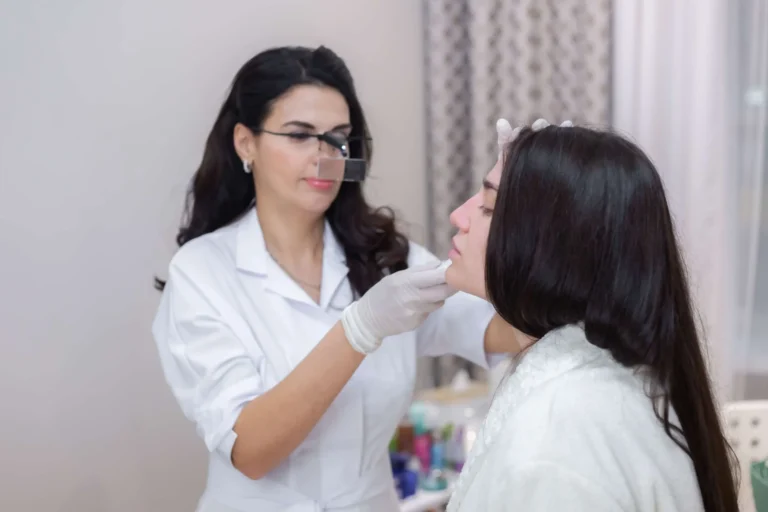Dealing with persistent skin issues or dermatological problem can be frustrating and impact your confidence. Conditions like acne, eczema, and rashes are not only uncomfortable but can also affect your overall well-being. Understanding when to seek a private dermatologist help is key to maintaining healthy skin.
Common skin conditions, if left untreated, can worsen over time. They may cause physical discomfort and emotional distress, making it essential to address them early. Proper diagnosis is the first step towards effective treatment and prevention.
A Private GP plays a crucial role in assessing skin issues and providing initial treatment. When necessary, they can refer you to a dermatologist for specialised care, ensuring you receive the right treatment for your condition.
Common Skin Conditions
Skin conditions like acne, eczema, and psoriasis are quite common and can affect anyone. While some may be mild and manageable, others may need medical attention.
Recognising the signs early is crucial. Conditions that persist, worsen, or cause significant discomfort should not be ignored. Getting the right diagnosis is key to effective treatment and relief.
Eczema (Atopic Dermatitis)
Eczema is a common skin condition that causes dry, itchy, and inflamed skin. It can affect both children and adults, often recurring throughout life.
Symptoms: The skin may become red, cracked, and severely itchy, with inflammation being a key feature. Flare-ups can occur in response to various triggers.
Triggers and Management Options: Common triggers include allergens, stress, and harsh soaps. Managing eczema involves moisturizing regularly, avoiding known irritants, and sometimes using medicated creams prescribed by a doctor. For more severe cases, consulting a dermatologist may be necessary.
Acne
Acne is a common skin condition that can affect people of all ages. It often causes frustration due to its persistence and impact on appearance.
Causes and Symptoms: Acne is caused by clogged pores, inflammation, and hormonal changes. Symptoms include blackheads, whiteheads, and inflamed pimples, often appearing on the face, chest, and back.
Treatment Options and When to Seek Specialist Care: Mild acne can often be treated with over-the-counter creams and proper skincare routines. However, if acne becomes severe or doesn’t improve with basic treatments, seeing a dermatologist is essential for more advanced care, such as prescription medication or specialised treatments.
Psoriasis
Psoriasis is a chronic skin condition that can cause significant discomfort and impact daily life.
Symptoms: It presents as thick, scaly patches of skin, often red and irritated. These patches typically appear on the elbows, knees, scalp, and lower back.
Understanding Its Chronic Nature and Potential Treatments: Psoriasis is a lifelong condition, but symptoms can be managed with the right treatments. Options include topical creams, light therapy, and prescription medications. Consulting a dermatologist is crucial for creating a personalised treatment plan that keeps flare-ups under control.
Rosacea
Rosacea is a long-term skin condition that primarily affects the face, causing noticeable redness and discomfort.
Symptoms: Common symptoms include persistent redness, visible blood vessels, and swelling on the face. It may also cause bumps that resemble acne.
Importance of Early Detection and Management: Early detection is key to preventing rosacea from worsening. Managing triggers, such as sun exposure and stress, along with treatments like topical creams or laser therapy, can help control symptoms. Consulting a dermatologist ensures proper care and long-term management.
Skin Infections
Skin infections can be caused by bacteria, viruses, or fungi and vary in severity.
Overview of Bacterial, Viral, and Fungal Infections: Common examples include impetigo (bacterial), warts (viral), and ringworm (fungal). These infections can cause discomfort, itching, and visible skin changes.
Treatment and Prevention Strategies: Treatments depend on the type of infection and may include antibiotics, antiviral creams, or antifungal medications. Good hygiene and avoiding direct contact with infected skin can help prevent the spread of these conditions. Consulting a dermatologist is essential for proper diagnosis and treatment.
When to Seek a Dermatologist

If a skin condition persists, worsens, or causes significant discomfort, it’s time to see a dermatologist. Early intervention is key to preventing complications and ensuring effective treatment. For any skin changes, unusual growths, or recurring issues, consulting a specialist is the best step to protect your skin health.
Signs that Indicate the Need for Specialist Care
Knowing when to consult a dermatologist can make a big difference in managing skin conditions effectively.
- Chronic or Worsening Skin Conditions: If your skin problems persist or worsen despite treatment, it’s time to seek specialist advice.
- Persistent Rashes or Growths: Unexplained rashes or growths that don’t heal should be examined by a dermatologist.
- Severe Acne Unresponsive to Over-the-Counter Treatments: If acne doesn’t improve with basic skincare, a dermatologist can offer more effective treatments.
- Suspicious Moles or Changes in Skin Appearance: Any changes in the size, shape, or colour of moles should be checked to rule out skin cancer.
Benefits of Early Intervention
Acting early on skin conditions can prevent complications and ensure faster recovery.
Preventing Worsening Conditions: Early diagnosis can stop skin problems from becoming more severe or chronic, saving time and discomfort later on.
Effective Treatment Plans: Starting treatment sooner allows for more effective results, as mild conditions are easier to manage than advanced ones.
Peace of Mind: Early intervention also offers reassurance, helping to identify and address any underlying health concerns promptly.
Role of a Private GP in London
A Private GP in London plays a crucial role in assessing and managing skin conditions. They provide an initial diagnosis, offer treatment options, and refer you to a dermatologist if needed. Their personalised care ensures that your concerns are addressed quickly and effectively, giving you peace of mind and timely access to specialist services.
Initial Assessment and Diagnosis
A Private GP is often the first step in identifying skin conditions.
How a GP Can Help Identify and Manage Early Skin Conditions: During an initial assessment, the GP examines your symptoms, asks about your medical history, and may run basic tests. They can provide early treatment options, such as topical creams or medications, and monitor your progress. If needed, they will refer you to a dermatologist for more specialised care.
Referrals to Dermatologists
A GP will refer you to a dermatologist when specialised care is needed.
When and Why a GP Refers Patients to Specialists: If your skin condition requires more advanced treatment or if symptoms persist despite initial care, your GP will refer you to a dermatologist. This ensures you receive the right expertise for your condition.
Ensuring a Smooth Transition from GP Care to Dermatology Consultations: Your GP will coordinate the referral process, sharing relevant medical history with the specialist. This helps ensure a seamless transition and comprehensive care for your skin condition.
Treatments Offered by Dermatologists
Dermatologists provide specialised treatments for various skin conditions, tailored to individual needs.
They offer a range of options, including topical creams, oral medications, and advanced therapies like laser treatments or light therapy. Each treatment is designed to target specific skin issues, ensuring effective and long-lasting results. A dermatologist will create a personalised plan to address your unique condition and concerns.
Overview of Common Treatments for Skin Conditions
Dermatologists use a variety of treatments depending on the severity and type of skin condition.
Topical Treatments (Creams, Ointments): These are often the first line of treatment for conditions like eczema, acne, or psoriasis. They help soothe symptoms and reduce inflammation.
Oral Medications: For more severe cases, oral medications may be prescribed to manage skin conditions from the inside, such as antibiotics or hormone therapies.
Specialist Treatments (Laser Therapy, Light Therapy): Advanced treatments like laser or light therapy are used for persistent or complex conditions, offering targeted relief and improving skin appearance.
Importance of Personalised Treatment Plans
Every skin condition is unique, and so is its treatment.
A personalised treatment plan ensures that the specific needs of your skin are addressed. Dermatologists tailor treatments to your condition, lifestyle, and medical history, making sure you receive the most effective care. This approach improves outcomes and helps manage the condition in the long term.
Preventing Skin Issues
Preventing skin problems is easier with the right habits and care.
Maintaining a healthy skincare routine, using sun protection, and staying hydrated are key to keeping your skin in good condition. Avoiding harsh products and managing stress also play important roles in preventing common skin issues. Taking proactive steps now can help reduce the risk of future problems.
Healthy Skin Habits
Developing good skincare habits is essential for maintaining healthy skin.
Daily Routines and Skincare Products Recommended for Healthy Skin: Cleansing your face twice a day with a gentle cleanser helps remove dirt and excess oil. Using a moisturiser keeps your skin hydrated, and applying sunscreen daily protects it from harmful UV rays. Choosing products suited to your skin type can prevent irritation and promote long-term skin health.
Diet and Lifestyle Factors
What you eat and how you live can greatly impact your skin’s health.
How Nutrition and Lifestyle Affect Skin Conditions: A balanced diet rich in fruits, vegetables, and healthy fats can improve skin health. Drinking plenty of water helps keep your skin hydrated. On the other hand, high sugar or processed foods can trigger acne and other conditions. Maintaining a healthy lifestyle, including regular exercise and managing stress, also plays a key role in keeping your skin clear and glowing.
Sun Protection
Protecting your skin from the sun is one of the most important steps in maintaining healthy skin.
Importance of SPF and Protecting Skin from UV Damage: Daily use of sunscreen with at least SPF 30 helps shield your skin from harmful UV rays. Prolonged sun exposure can lead to premature ageing, sunburn, and increase the risk of skin cancer. Applying sunscreen, wearing protective clothing, and avoiding peak sun hours can significantly reduce these risks and keep your skin healthy in the long term.
Conclusion
Addressing skin concerns early is crucial for preventing complications and maintaining healthy skin. For persistent or serious issues, seeking advice from a GP is the best first step. Consulting a dermatologist ensures you receive specialised care for more complex conditions.
If you have any concerns about your skin, book a consultation with a Private GP today. Early intervention can make all the difference. Click here to schedule an appointment or contact us for more information.

